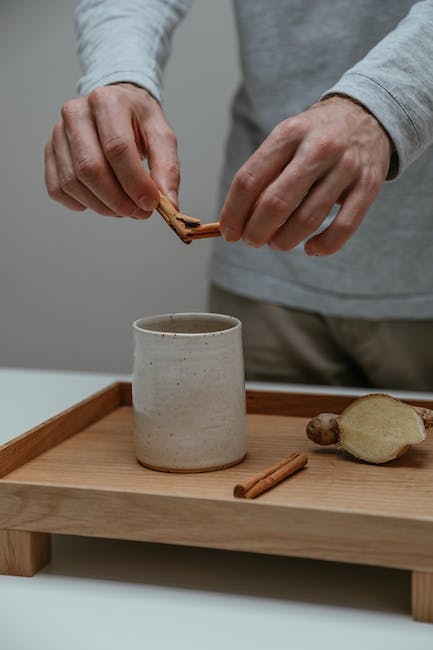The Healing Powers of Ginger: How It Can Help Alleviate Diarrhea Symptoms
Diarrhea is a common digestive issue that affects millions of people worldwide. It can be caused by a variety of factors, including bacterial infections, viruses, and food intolerances. While there are several over-the-counter medications available to treat diarrhea, natural remedies such as ginger have been gaining popularity in recent years. In this blog post, we will explore the benefits of ginger in treating diarrhea and how you can incorporate it into your diet.
Why Ginger?
Ginger has been used for centuries in traditional medicine to treat a variety of ailments, including digestive issues. The root contains a compound called gingerol, which has anti-inflammatory and antimicrobial properties that may help alleviate diarrhea symptoms. Studies have shown that ginger can help reduce the frequency and severity of diarrhea in both adults and children.
The Science Behind Ginger’s Effectiveness
A study published in the Journal of Ethnopharmacology found that ginger was effective in treating diarrhea caused by bacterial infections such as E. coli. Another study published in the Journal of the Medical Association of Thailand found that ginger was more effective at reducing diarrhea symptoms compared to a placebo. The exact mechanism of how ginger works to alleviate diarrhea is not fully understood, but it is believed to be due to its ability to reduce inflammation in the gut and inhibit the growth of harmful bacteria.
How to Use Ginger for Diarrhea
One of the easiest ways to incorporate ginger into your diet is by drinking ginger tea. To make ginger tea, simply steep fresh ginger root in hot water for 10-15 minutes. Adding honey or lemon can also help soothe the digestive system. Ginger can also be added to soups, stews, and smoothies for an extra boost of flavor and health benefits.
Precautions When Using Ginger
While ginger is generally considered safe for most people, it is important to note that it can interact with certain medications, including blood thinners and diabetes medications. It is always best to consult with your healthcare provider before adding ginger to your diet, especially if you have a pre-existing medical condition.
Conclusion
Ginger is a natural remedy that has been shown to be effective in treating diarrhea symptoms. Its anti-inflammatory and antimicrobial properties make it a great addition to any diet. Whether you prefer to drink ginger tea or add it to your favorite dishes, there are many ways to incorporate this healing root into your daily routine. As always, it is important to consult with your healthcare provider before using any natural remedies, especially if you have a pre-existing medical condition.
The Power of Ginger Tea: A Natural Remedy for Health and Wellness
Ginger has been used for centuries as a natural remedy for a variety of ailments. From nausea and indigestion to inflammation and respiratory issues, ginger has been known to provide relief. One of the most popular ways to consume ginger is through tea. In this article, we will explore how to make ginger tea and the benefits it can provide for your health and wellness.
How to make ginger tea
To make ginger tea, you will need fresh ginger root, about 2-3 inches long. Here are the steps:
- Peel the ginger and slice it thinly
- Boil 4 cups of water in a pot
- Add the sliced ginger to the boiling water
- Reduce heat and let it simmer for 10-15 minutes
- Strain the tea to remove the ginger slices
- Add honey or lemon juice to taste (optional)
- Drink the tea while it is still warm
For maximum benefits, drink 2-3 cups of ginger tea per day. Ginger tea can also be made with ginger powder or tea bags, but fresh ginger root is preferred for maximum benefits.
The benefits of ginger tea
Ginger tea has numerous benefits for your health and wellness. Here are just a few:
1. Aids in digestion
Ginger has been known to improve digestion by increasing the production of digestive juices and enzymes. It can also reduce inflammation in the gut, helping to relieve symptoms of indigestion, bloating, and constipation.
2. Reduces inflammation
Ginger contains compounds that have anti-inflammatory properties. Drinking ginger tea regularly can help reduce inflammation in the body, which is linked to a variety of chronic illnesses such as arthritis, heart disease, and cancer.
3. Boosts immunity
Ginger has been shown to have antibacterial and antiviral properties, making it a great natural remedy for colds and flu. Drinking ginger tea can help boost your immune system and keep you healthy.
4. Relieves nausea
Ginger has been used for centuries to relieve nausea and vomiting. It is particularly effective for morning sickness during pregnancy and can also help alleviate motion sickness and nausea caused by chemotherapy.
In conclusion
Ginger tea is a natural and effective way to improve your health and wellness. By following the simple steps outlined in this article, you can easily make ginger tea at home and reap the many benefits it provides. So, the next time you’re feeling under the weather or need a little digestive boost, reach for a cup of ginger tea.
5 Types of Tea for Better Digestive Health
Are you one of those people who often experience digestive problems such as bloating, indigestion, gas, or stomach pain? If so, you may want to consider adding some tea to your daily routine. While ginger tea is well-known for its digestive benefits, there are other types of tea that can also help improve your digestive health. In this blog post, we will introduce you to 5 tea options that can soothe your stomach and alleviate digestive discomfort.

1. Peppermint Tea
Peppermint tea is one of the most popular options for those looking to improve their digestive health. Peppermint has natural soothing properties that can help reduce stomach discomfort and bloating. It can also stimulate the production of bile, which can help break down fats and improve digestion. If you’re suffering from IBS (irritable bowel syndrome), peppermint tea has been shown to alleviate symptoms such as abdominal pain and gas.
2. Chamomile Tea
Chamomile tea is another great option for those with digestive issues. Chamomile has anti-inflammatory properties that can help soothe indigestion and nausea. It can also relax the muscles in the digestive tract, which can help ease cramping and discomfort. Chamomile tea has a mild, pleasant taste and is often used to promote relaxation and better sleep.
3. Fennel Tea
Fennel tea has been used for centuries as a natural remedy for digestive problems. Fennel seeds contain compounds that can help reduce gas and bloating. The tea can also stimulate the production of digestive enzymes, which can help break down food and improve digestion. Fennel tea has a slightly sweet taste and is often used as a digestive aid after meals.
4. Lemon Balm Tea
Lemon balm is a herb that has been used for centuries for its medicinal properties. Lemon balm tea can help calm the digestive system and relieve stomach pain. It can also reduce inflammation in the digestive tract and help improve digestion. Lemon balm tea has a refreshing, citrusy flavor that is perfect for a morning or afternoon pick-me-up.
5. Ginger Tea
We can’t talk about tea and digestive health without mentioning ginger tea. Ginger has natural anti-inflammatory and antimicrobial properties that can help alleviate digestive discomfort. Ginger tea can also stimulate the production of digestive enzymes and improve the absorption of nutrients. It’s a great option for those with nausea and morning sickness.
While these teas may provide relief for digestive issues, it’s important to note that they should not be used as a replacement for medical treatment if symptoms persist or worsen. If you have chronic digestive problems, it’s best to consult with your doctor or a registered dietitian to determine the best course of treatment.
So, next time you’re feeling bloated or uncomfortable after a meal, reach for a cup of one of these delicious teas. Your stomach will thank you!
Tea for Digestive Health: A Delicious Solution for Common Ailments
There’s nothing quite like a warm cup of tea, especially when it comes to soothing an upset stomach. Tea has long been used as a natural remedy for digestive issues, and for good reason. Here are some of the best types of tea to help ease common digestive problems:
Ginger Tea for Diarrhea
Ginger has natural anti-inflammatory and anti-bacterial properties that can help soothe the digestive system and reduce inflammation. To make ginger tea, simply boil water and add fresh ginger slices or ginger powder to it. Let it steep for a few minutes and strain before drinking. This tea is a great option for people suffering from diarrhea.
Peppermint Tea for Abdominal Pain and Discomfort
Peppermint tea is another great option for digestive health. It can help ease abdominal pain and discomfort, making it a popular choice for people with irritable bowel syndrome (IBS). Peppermint tea contains menthol, which has an antispasmodic effect that can help relax the muscles in the digestive tract.
Chamomile Tea for Inflammation and Relaxation
Chamomile tea has been used for centuries as a natural remedy for digestive issues. It can help reduce inflammation in the digestive tract and promote relaxation. Chamomile tea is also known for its calming properties, which can help reduce stress and anxiety that can contribute to digestive issues.
Fennel Tea for Bloating and Gas
Fennel tea is known for its ability to relieve bloating and gas. It contains compounds that can help relax the muscles in the digestive tract, which can help alleviate symptoms of bloating and gas. Fennel tea also has a mild licorice flavor that can be quite soothing.
Drink Tea in Moderation
While tea can be a great natural remedy for digestive issues, it’s important to drink it in moderation. Drinking too much tea, especially if it contains caffeine, can actually have the opposite effect on digestion and lead to further irritation. It’s recommended to drink tea in moderation and consult with a healthcare professional if you have any concerns.
In conclusion, tea can be a delicious and natural solution for common digestive ailments. From ginger tea for diarrhea to peppermint tea for abdominal pain, there’s a type of tea that can help ease your symptoms. Just remember to drink tea in moderation and consult with a healthcare professional if you have any concerns.


Leave a Reply